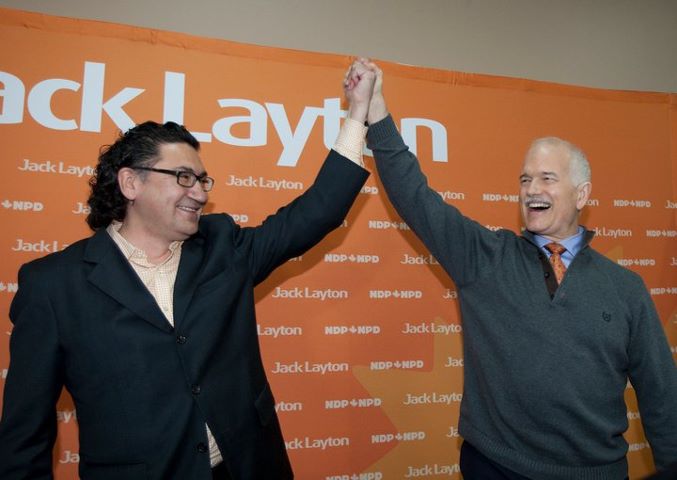Young Indigenous people don’t have a lot of role models within the dominant power structures. From the classroom to media personalities and celebrities, I do not see my culture or identity reflected back at me. The House of Commons is no exception to this rule. The reins of power are very much held by stiff white men who are completely out of touch with the colonial reality of Canada.
Young Aboriginal people are bombarded with stats about Aboriginal dropout rates in high school and university. We also have to face the reality that a disproportionate number of our people are incarcerated in the criminal justice system, and the staggering stats about violence towards Aboriginal women. We have to listen to racist stereotypes every day about not being good enough or never amounting to anything.
Romeo Saganash’s historic bid for leader of the New Democratic Party was a milestone, and touched the lives of many Indigenous people, especially our youth. This article tells the story of two young Indigenous activists and what Romeo’s campaign meant to them.
Max Fine Day, Cree, Saskastoon
“Friends, I’d like to tell you about what we can achieve, together, for Canada.”
It was with that sentiment that Romeo Saganash started and has ended his leadership campaign. Although this contest has been hard fought and came with many challenges, New Democrats were lucky to have Romeo in this race as long as we did. A leader for over 25 years, a man with intelligence, compassion and vision, Romeo came equipped with progressive ideas that would benefit all Canadians. But perhaps most importantly, he has given a generation of young people, like me, reason to hope when things seem the most hopeless.
I’m proud that I worked on his campaign. As the first Indigenous person (coming from the James Bay Cree) to seek leadership of a federal parry, I’m able to say that he made me proud of who I am. I was amazed by the many friends and strangers throwing support behind this man. His journey from residential school to leadership candidate shows how far we’ve come in Romeo’s lifetime. There is certainly still work to be done on the path to reconciliation between First Nations and non-First Nations, but Romeo’s campaign was an important step forward.
We saw through Romeo’s campaign that there is a better way to do politics. We do not have to give in to the media’s ‘boredom’ with our leadership race, prompting candidates to try to attack each other’s ideas during a debate, that’s not the way forward. Romeo’s unique way of communicating ideas and connecting to the grassroots of our party is exactly what it means to be a New Democrat. We need to focus our points of difference with the current government, not each other. Our commitment to common goals is a point of strength, it speaks to who we are, and we shouldn’t let those outside our party tell us otherwise.
I can’t say that I’m not disheartened to see Romeo go, I am. In a party dedicated to social democratic principals of equality and fairness, it’s a sad reminder that the world is not in fact equal and that contests such as these are heavily reliant on who has substantial finances. It’s in that spirit that I ask, if you haven’t done so yet, please consider donating whatever you can to Romeo’s campaign today.
Kinanâskomitin to Romeo, for paving the way to what is possible for the next generation of leaders.
Tria Donaldson, Mohawk, Victoria B.C.
I was powerfully inspired by Romeo Saganash’s campaign, and incredibly saddened to see him leave the race. Romeo’s incredible track record of leadership, his thoughtful vision for Canada and the passionate way he spoke about social democratic values brought a lot to the leadership campaign. But for me, and for many other young folks, the power of Romeo’s campaign went beyond just him as a person. For me he represents hope.
Hearing Romeo speak in Cree during a leadership town hall in B.C. was one of the most inspiring and emotional moments I have experienced as part of any social change movement. My heart sang with joy to hear an Indigenous language spoken by a potential prime minister.
Like Romeo, my grandfather was a residential school survivor. Sixty years ago, when grandfather was in residential school, it would have been impossible to imagine an Indigenous person running for leadership of the official opposition. And Romeo helped break that mould open.
Despite the historic nature of Romeo’s campaign, it was not without difficulties. Though well-liked, Romeo’s campaign had difficulty gaining traction, both in the media and within the party membership. His fundraising numbers were quite low, though higher than Niki Ashton, who is also well-liked but often dismissed because of her youthful age.
As Romeo said, “it is impossible to run a winning campaign as the favourite second choice. People send you good wishes, but they don’t send their money.”
Romeo’s credibility was often challenged by the media, who never saw him as a serious candidate. I think the best rebuttal to that line of thought was a tweet from Romeo, which will also go down as the best use of social media in the campaign so far: “Learn four languages, negotiate treaties, defend rights, become an MP. Still get asked if you’re a ‘serious’ candidate. #nativeguyproblems.”
As an Indigenous person, Romeo faced challenges and problems that a settler candidate would not have to face — that is for an uphill battle to be taken seriously, to be valued for your skills alone.
We need people like Romeo to stand for office not only for his amazing ideas and leadership experience, but because he is lighting the way forward for so many others. He is showing us what is possible.



